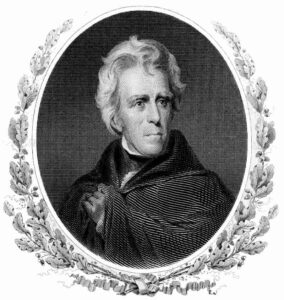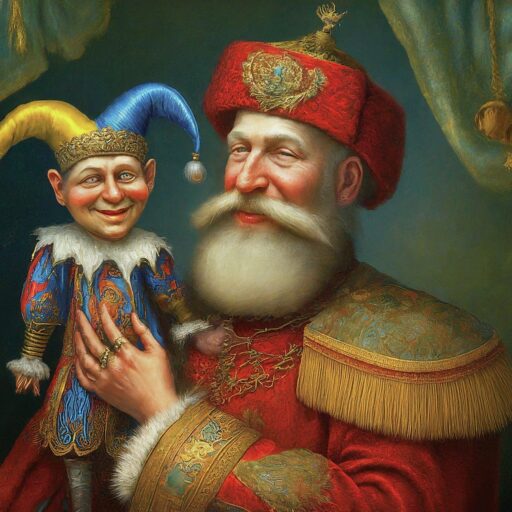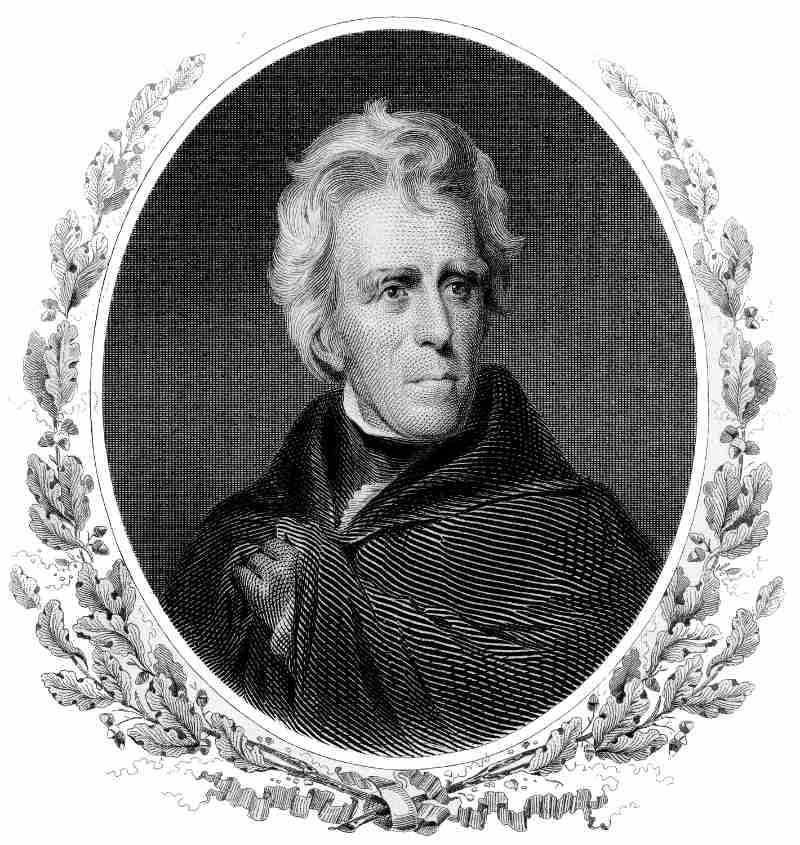The Oval Office, Washington, D.C.
The U.S. president relaxes back in his chair behind his desk in the Oval Office. Out the window at his back is the historic Lafayette Square. He looks around the confines of his stately Oval Office (perhaps the most celebrated space in all official Washington) and its tasteful appointments, admires the antique furnishings and the hallowed pictures of past presidents hung up on the walls.
 He wants to appreciate the history and tradition that surrounds him; but the truth is—because he has never read or studied—he has no real sense of the history, no appreciation of the traditions, the protocols, or norms of the office of the President, or the character of the men (past presidents) who have come before him. Because he hates everything Obama, he has—immediately following his inauguration—directed the White House curator to take down the portrait of Lincoln, so favored by his predecessor, and replace it instead with one of Andrew Jackson.
He wants to appreciate the history and tradition that surrounds him; but the truth is—because he has never read or studied—he has no real sense of the history, no appreciation of the traditions, the protocols, or norms of the office of the President, or the character of the men (past presidents) who have come before him. Because he hates everything Obama, he has—immediately following his inauguration—directed the White House curator to take down the portrait of Lincoln, so favored by his predecessor, and replace it instead with one of Andrew Jackson.
The Bad King does not really know anything personally or factually about Andrew Jackson. Some aides have told him that Jackson was a cantankerous, slightly obstreperous man who fought a duel and killed a man who had insulted his wife, Rachel. He knew the nickname, Old Hickory, and he knew that Jackson had been a southern populist and a general—a famous bigot who had persecuted the Native American Indians, put them on a death march that saw thousands of them die in the forced migration west.
The president fancies himself a populist in the mold of Andrew Jackson. After all, he has campaigned on the phony slogan (first exploited by that equally phony Republican demigod, Ronald Reagan) “Make America Great Again.” And he particularly likes to identify with generals even though he himself has never served a day in the military. Instead, he was rather fortuitously—with the help of his father’s money and influence—able to avoid the draft and service in Vietnam by parlaying a phony bone-spur into five medical deferments. It is a private joke that his greatest personal risk during the Vietnam era had been on the home front in fashionable New York bars and discos avoiding (STD’s) sexually transmitted diseases.
Even as the Republican candidate, he never expected to be there in that office—not in a million years. He just thought he would make a publicity run for president of the United States on the GOP ticket, lose the election, and then with help from his advisers like Steve Bannon (his ideology czar and lead anarchist) launch a start-up media empire—a new conservative cable news network to rival Rupert Murdoch’s Fox News. Only he would be different and better than Fox. He would—with the help of Roger Ailes—put his buddy Rupert Murdoch out of business. Now by some outrageous stroke of fortune (Russian meddling in the election) he is president of the United States. The thought, however, frightens him because he knows—in his heart of hearts—that he is not qualified, mentally, or temperamentally, to be sitting in the Oval Office.
He rises from his chair, turns, and looks out the window toward Lafayette Square. He thinks about the Clintons, Bill, and Hillary. They had been his friends once. He had wanted them at his wedding to his latest wife, Queen Slovia, so badly that he bribed them with a political contribution to their foundation (the same foundation he now attacks as evidence of the Clinton’s corruption). But that is water under the political bridge. He smiles to himself when he thinks how effectively he had demonized Hillary during the election by unfairly branding her “Crooked Hillary.” But what the heck. That is his personal style in business and politics—destroy your opponent with lies and innuendo. The Bad King – now that he is in office – feels no remorse. That, after all, is the rough and tumble of politics, and he prides himself on being the best politician in America. After all, he defeated seventeen other primary opponents for the Republican nomination.
Still, he loves the campaigning, loves being the man at the center of the world’s attention. And it is so easy. You just give people what they want (a border wall to keep out the rapist and murders from Mexico) and tell them what they want to hear, that—if elected—you will repeal Obama Care.
The Bad King knows that he is good at that—making promises that he never intends to fulfill. As a New York real estate developer and confidence man, he did that for years. He turns back around now, looks at the portrait of Andrew Jackson on the wall, and laughs quietly to himself. Who knows, he muses to himself, maybe someday some future president will have my portrait hanging in that exact same spot. After all, Old Hickory had been a Democrat, and he, too, had started out a Democrat back in New York where it was fashionable to be liberal. The irony amuses him. But he has made the strategic switch to Republican not out of any deep conviction or conservative set of principles, but merely because he had determined early on—and he had proved himself right—that Republicans were the only ones stupid enough to vote for him. He is now convinced that Americans—at least the forty-percent minority that put him in office—are the most gullible, politically naive, ill-informed, and stupid people on the planet. After all, he won the hearts of conservatives with his birther nonsense that Obama was not born in the United States and thus not a legitimate president.
Again, he smiles to himself. He has even said as much in public on the campaign trail, but people voted for him anyway because he told them (lied to them) that he was going to bring back their jobs—lost to the globalization and financialization of the world economy—which he knew himself he could not do. He told them he was going to “drain the swamp” in Washington and “Make America Great Again.” It was all a lie. Instead, he put his billionaire Wall Street cronies (Steve “the money grubber” and Wilbur “the crook”) in his cabinet and appointed them to top government jobs where they are all—even at that very moment—feeding like pigs at the public trough. The various scandals around his cabinet ministers have caused a public outcry with some resigning in disgrace and others being unceremoniously fired.
It was all lies; but a gullible American public bought it—at least enough of them that he had been able to eke out a thin margin of victory in the electoral college. Again, he chuckles to himself. He must give old “Crooked Hillary” credit. She ran a formidable campaign against almost impossible odds (Russian election meddling, the Comey letter, and a phony e-mail scandal), and yet she managed to beat him by over three million popular votes. But she never really stood a chance because he had his friends, the Russians—Tsar Peter and his oligarch cronies—on his side. They hacked the DNC e-mails, and his long-time adviser and fellow crook Roger Stone had weaponized Gucifer 2.0 (a Russian GRU cut-out) and Julian Assange at WikiLeaks to dump them all on the internet. This was particularly helpful at the time the Access Hollywood video revealed him boastfully and gleefully talking about “grabbing women by their pussy.” Again, he laughs, chuckles quietly to himself. Poor “Crooked Hillary” never had a chance.
Rigolets on Lake Pontchartrain
At his private boat dock at Rigolets, pronounced (Rig-uh-leez), Billy Tidewater is down in the hull of his 85-foot shrimp and lobster trawler, the Delta Queen, working on the engines. It is late in the afternoon when he hears someone come on board. He puts down his wrench and looks up through the open hatch to the deck above. A girl appears. She is about thirty-years old and quite attractive. Billy follows the cable news on MSNBC, and he recognizes her immediately.
The girl bends slightly over and peers down into the cramped engine hold. “Are you Billy Tidewater?
Billy looks up at her and smiles. “That depends on who is asking,” he says with a grin.
“My name is Rosario Brown. I am a reporter/correspondent on MSNBC. I am a friend—was a friend,” she says ruefully, “of Scott Franklin.”
Billy had heard about the suspicious death of his friend, Scott. He looks up at the girl. “I know who you are. Scott mentioned you the last time we talked. You’re a little off your usual Washington beat, aren’t you?”
Rosie glumly nods. “Scott told me if something happened to him, I was to come here and find you.” Rosie tells Billy about the file that she recovered at the airport. She gives him a cursory description of the file’s contents. “He said you have friends in Washington in the intelligence community, that you would know what to do.”
Billie casually wipes his hands on a clean oil rag, steps onto the ladder and comes up out of the hull. Once on deck, Rosie notices that he is tall, well over six feet. His T-shirt is stretched tight across his broad chest, and his arms are big and muscularly well-developed. Rosie is impressed, briefly imagines him as a knight in shining armor—a kind of Lancelot—because that is what she desperately needs.
Again, Billy smiles. “He did—did he?”
“Yes,” Rosie says in earnest, staring back at the handsome, dark complected Scots Irish, French Creole man standing in front of her. She guesses him to be in his mid-thirties. Even though it is warm and rather humid, he wears a black, stretch woolen knit sailor’s cap over a close-cut crop of curly black hair. In another bygone era he might have been a Barbary pirate.
“Well, Scott always did like to take an optimistic view of things,” Billy replies. “Is that why you’ve come here?”
Rosie forges ahead, ignores Billy’s question. “You know, of course, that he was killed?”
Billy sighs, gets a reflective look. “Well, the report I heard on the cable news was that he was found in his house, sitting in a chair with a book in his lap, dead of an apparent heart attack.”
Rosie is matter of fact. “Well, that’s a lie. Scott was a marathon runner. He was in great shape. You know that. The story is an obvious cover-up.”
Billy frowns. “Then you believe he was murdered?” It is more a statement than a question.
“Yes,” Rosie returns in a firm voice.
Billy pauses for a second. “Are you hungry?” he finally asks.
Rosie is surprised and taken aback at the quick change in subject. But she is always hungry, doesn’t remember when she last ate. She smiles, then: “Yes,” she responds.
“Good,” Billy replies. “Let’s go get some tacos. I know a great place up on the wharf.”
“Okay,” Rosie readily agrees. Already she is starting to like this guy. Not only is he good looking, but he has a warm smile and an easy likeable manner.
Rosie leaves her suitcase containing the secret file on the boat. Billy takes her to one of his favorite outdoor spots on the wharf. They sit on some benches out on the pier and, with gulls swooping over their heads, Rosie tells Billy her story—her professional relationship with Scott and how she came into possession of the Project: Red Dragon file.
Billy is skeptical, and wary, not sure at first that he wants to get involved. He looks again at the beautiful young girl sitting across from him, and then says, “When we get back to the boat, you can show me this—Project: Red Dragon—file.”
“Okay,” Rosie replies. “I have it in my suitcase.”
They take a long walk along the beach. Billy explains that he knew Scott from when they clerked together on the Supreme Court. Then, just as the sun is going down, they stop in a bar for a drink.
Later, back at the boat, Rosie lets Billy read the file. They talk and each drink a couple more beers out of the refrigerator. It gets late and it is decided that Rosie will stay the night on the boat. Billy goes up into the bow of the Delta Queen and makes a bed for her in one of the forward cabins.
After she goes to bed, but before she goes to sleep, Rosie reflects with amazement on all that has happened in the last twenty-four hours. No doubt there are dangerous people probably looking for her, and she is alone on a boat with a man she does not even really know—yet, somehow, she feels safe for the first time since she heard the news about Scott. She closes her eyes and drifts off into a blissful and untroubled sleep.
The next morning, Billy lets Rosie sleep. When she wakes and comes aft, he is in the galley cooking eggs and bacon and hash brown potatoes for breakfast.
“You’re an early riser,” Rosie says as she takes a seat at the table in the small galley.
Billy just smiles, looks briefly at her and peers out the cabin window. “Maybe,” he responds, gazing up at the rising sun, “. . . but in a couple of hours it’ll be noon.”
Rosie is nonchalant, “I guess I was more tired than I thought.”
“Yeah, I guess so,” Billy replies with a wide grin. He sets a plate down in front of her on the table. “Here,” he says, “have something to eat. And then if we can get this old boat started, and if it is still not too late, we’ll go out into the Gulf and do some crab fishing.”
Rosie can hardly believe her ears. “You’re really serious?” she says with surprise. “I mean about fishing?”
Rosie stares up at the handsome young fisherman who has so unexpectedly and abruptly come into her life. She is a serious Washington journalist, a political reporter, and an MSNBC news anchor. Rosie wonders at the absurdity of it all. Her best “deep background” source into The Bad King’s maladministration of the government has just been mysteriously murdered, and she has in her possession the secret file that got him killed. There are dangerous people lurking out there somewhere probably looking to kill her. She is on a boat with a man she hardly knows—and he wants to take her fishing.
Billy smiles back at her. “Yeah, that’s what I do. I’m a fisherman.”
“Okay,” Rosie says somewhat hesitantly. This is all crazy, Rosie thinks. But the one thing she knows, she feels safe around this fisherman.
“You finish eating,” Billy says. “I’ll be right back. I’m going up on the public dock. We are going to need an extra hand out on the boat. There’s an unemployed fisherman, a man named, Raul, who usually hangs around looking for work. I want to see if he’s available to help us.”

